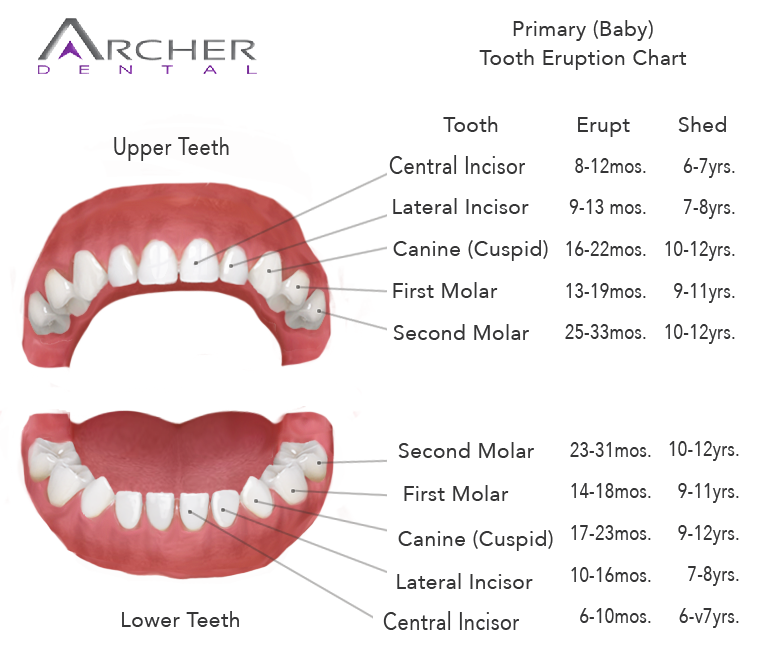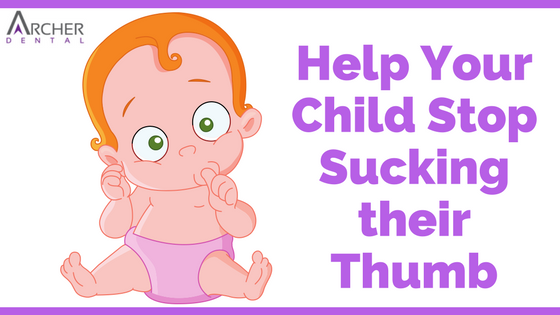About Primary Teeth, or Baby Teeth
Did you know that baby teeth are also known as primary teeth or deciduous teeth? These teeth start to develop early in pregnancy and will begin to erupt in a child’s mouth approximately six months after birth. Primary teeth are place holders for adult dentition. Children usually start losing their baby teeth at six years of age. By the time children turn twelve, all twenty baby teeth are replaced with thirty-two permanent teeth. Archer Dental provides pediatric dental service in a comfortable, stress-free environment where we strive to make dental care fun for kids as well as educational.
How can you tell if your child is teething?
Redness and sore gums are sure signs that your child’s baby teeth are what dentists call erupting. Other signs of teething include flushed cheeks mild temperatures, ear soreness/rubbing, facial rashes, greater drooling, chewing/gnawing, and changes in behaviour including sleep.
When to worry about primary teeth not coming in?
Parents can use the chart below to keep an eye on the timelines and monitor their child’s dental development. If you are not observing baby teeth by the time your child turns one year old, baby teeth are not noticeable at twelve months of age, they should visit the dentist who will determine if they should see a specialist.

The first tooth to erupt is usually the central incisor — middle, front tooth — on the lower jaw. The second tooth to come is usually right next to the first: the second central incisor on the lower jaw.
The next four teeth to come in are usually the four upper incisors. They usually start erupting about two months after the same tooth on the lower jaw comes in. The second molars are usually the last of the twenty deciduous teeth, to erupt and this occurs when the child is about two-and-a-half years old. We recommend you bring your child to see us within 6 months of the first tooth coming in, or at one year of age.
Why do some toddlers grind their teeth?
Infrequent baby teeth grinding is usually harmless behaviour. Children must test their new teeth to feel the bite. Teeth grinding, can happen while your child is awake or during sleep. Regular patterns of grinding can lead to a condition known as bruxism., In children, most bruxism cases are mild and may be treated with behaviour remedies.
When should I start brushing my child’s teeth?
Cleaning gums as part of your baby’s daily routine will help your child develop great dental hygiene habits. Gums may be cleaned by using a clean damp washcloth and a gentle wiping motion. You can start brushing baby teeth as soon as the first tooth emerges. Use a small headed child’s toothbrush and a very small amount of children’s toothpaste
Can primary teeth come in crooked?
Yes. It’s not uncommon for baby teeth to erupt at odd angles and be misaligned. Baby teeth are simply placeholders for adult teeth and they help guide permanent teeth into position when they appear later. This development can still occur and yield perfectly straight teeth even if the infant’s primary teeth are not entirely straight.
Genetics play the largest role in how baby teeth develop. Large teeth from dad can combine with mom’s smaller mandible and result in the child having an overcrowded mouth. This can happen as the primary teeth begin to emerge around six months of age. But one parent’s crooked teeth is not a reliable indicator as to whether or not their child will have crooked permanent teeth.
Thumb or pacifier sucking? Archer Dental shares strategies to Help Your Child Stop Sucking Their Thumb.
Another contributor to crooked tooth development and misalignment is thumb or pacifier sucking behaviour. But the act of sucking is natural and this instinct leads to a better grasp of the breast during breastfeeding. The pacifier works because simply putting something in their mouth calms and soothes the child.
Most pediatric dentists and health professionals agree that pacifier use is not harmful to your baby’s dentation as long as the practice is not continued past age three, or thirty-six months of infancy. Most health practitioners prefer parents using a pacifier rather than allowing their child to suck the thumb, as trying to break a thumb sucking habit is more difficult as the child gets older.
Do milk teeth have roots?
Yes, primary teeth, also called milk teeth have roots. A tooth without roots would not be stable enough to be employed as a chewing tool. Thinking baby teeth have no roots is a common misconception however because parents will often notice their child’s teeth are shed without any roots. The reality is that primary teeth roots dissolve when permanent teeth grow, and so the roots of baby teeth are not visible when they’re shed. Baby teeth usually don’t have any roots on them by the time they are lost, but they do have roots while they are being used in the mouth.
Occasionally, some baby teeth never fall out. In fact, some adults may not realize they still have baby teeth. We see this condition when dental care has been a low priority. Your dental care is important. Regular check ups are the best way to make sure your teeth are in great shape.
Why do primary teeth fall out?
Baby teeth are placeholders for adult teeth. As the jaw grows, spaces develop to make room for larger, permanent teeth. The root area of a baby tooth allows the permanent tooth a place to grow and break through the gums. As the permanent teeth grow through the root area, the baby teeth loosen and will fall out. Baby teeth usually fall out between the ages of 6 to 12. During this time, regular check ups are important to make sure permanent teeth have sufficient room and are growing properly.
Is tooth decay an issue for primary teeth?
Tooth decay can adversely impact tooth growth. Baby teeth are actually more susceptible to decay because they have a thinner enamel than permanent teeth. This is why it’s so important to both teach and reinforce good brushing and flossing habits with young children.
Drink the tap water. Fluoride added to tap water provides an extra level of defense to your child’s baby teeth. Fluoride strengthens the surface of all teeth by being absorbed into the enamel.
Children can and commonly do experience cavities. Good oral hygiene and healthy habits are the best way to resist these outcomes. The Archer Dental blog has a helpful article related to taking care of baby teeth.
Can you use primary teeth for future medicines?
Archer Dental is aware of a growing trend in dentistry in which baby teeth can be preserved for their medical potential as it relates to stem cells. Doctors and dentists now advise parents save some of their child’s baby teeth for this purpose. The teeth should be kept somewhere safe, dry, and secure.
Archer Dental is all about advancing dental care in our changing world. and so we’re watching this space. We note the studies which indicate that baby teeth are a potentially rich source of stem cells to be harvested and used to grow other cells. According to a study in the National Institute of Dental and Craniofacial Research, stem cells found in baby teeth are unique in structure and can be manipulated and used to repair tooth damage, as well as neural injuries and induce bone regeneration. The science is still developing, but having baby teeth in storage can possibly yield more treatment options, now and in the future.


